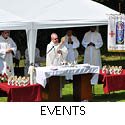
The Prior Provincial, Fr Kevin Alban reflects on Easter 2020..
Undoubtedly, Easter 2020 will be remembered as one of the strangest celebrations ever. I can hardly think of a time when all church buildings have been closed and there has been no public celebration of the Holy Week ceremonies. Even in the Second World War Mass was celebrated publicly and people were able to participate in the liturgy. What might our reaction be to this situation?
Certainly, the lack of public celebrations, of the familiar rites of foot-washing, veneration of the Cross and the Easter fire is deeply felt by all. I am especially thinking of those who would have been received into the Church at this time and the disappointment they must feel. Even those, who for one reason or another could not manage to attend the Holy Week liturgies, will miss the joyful and colourful Easter morning Masses. In part, this lack has been made up for by the provision of liturgies and Masses online from cathedrals and parish churches around the country. We are very fortunate to have the technological means to offer these services and liturgies. However, it would be good to spare a thought for many people who do not have access to these means. The great expansion of access via digital pathways has not been uniform and there is the real risk of creating a two-class society: those with the internet and those without.
There will be a strong sense of loss on the part of those who cannot attend Church this Easter and even more so on the part of those who have no means of watching Mass online. The feeling of emptiness and pain is not unlike that experienced by Jesus’ disciples after his body had been taken down from the Cross. On Good Friday and Holy Saturday Jesus is absent. All the gospels present the primary symbol of Jesus’ resurrection as an empty tomb.
The point is that “He is not here – he has risen”. But the initial impact is one of loss, barrenness, desolation. In John’s gospel, Peter and the Beloved Disciple race towards the emptiness and look inside. That is a powerful image and challenge. Our natural instinct would be to turn away from emptiness or seek to fill it. The two disciples embrace the darkness and the void by going inside for themselves. Do we have the courage to run towards the emptiness and to look inside our own darkness? Sometimes by acknowledging where God is not, it might lead us to where God is.
In the Carmelite tradition the figure of Elijah is helpful here. In his emptiness, fear and sense of abandonment he throws himself under a bush and simply wants to die. But God has other plans for him: he leads him up Mount Horeb for an encounter that will reshape our image of God:
Then the Lord said to Elijah, “Go, stand in front of me on the mountain. I, the Lord, will pass by you.” Then a very strong wind blew. The wind caused the mountains to break apart. It broke large rocks in front of the Lord. But that wind was not the Lord. After that wind, there was an earthquake. But that earthquake was not the Lord. After the earthquake, there was a fire. But that fire was not the Lord. After the fire, there was the sound of silence. (1 Kings 19: 11-12)
God is not in the classical signs of his presence, the wind, the earthquake or the fire. Instead Elijah hears the “sound of silence” – a contradiction, a paradox – and understands it is the sound of the Lord. The familiar signs and symbols are sometimes emptied of meaning in order to push us towards the reality of God. And this reality is a puzzle and maybe also a challenge.
One of the greatest Carmelite writers, St John of the Cross, adopts the same images of darkness and emptiness to remind us that when we feel that God has abandoned us, He is in fact closer than ever. "In the dark night of the soul, bright flows the river of God." (Dark Night of the Soul)
The loss, the emptiness and the lack of the familiar are not pleasant sensations as we are all discovering. But perhaps they are also pointers to where God is in our lives.
Kevin Alban, O.Carm
SAINT JUDE, PRAY FOR US














